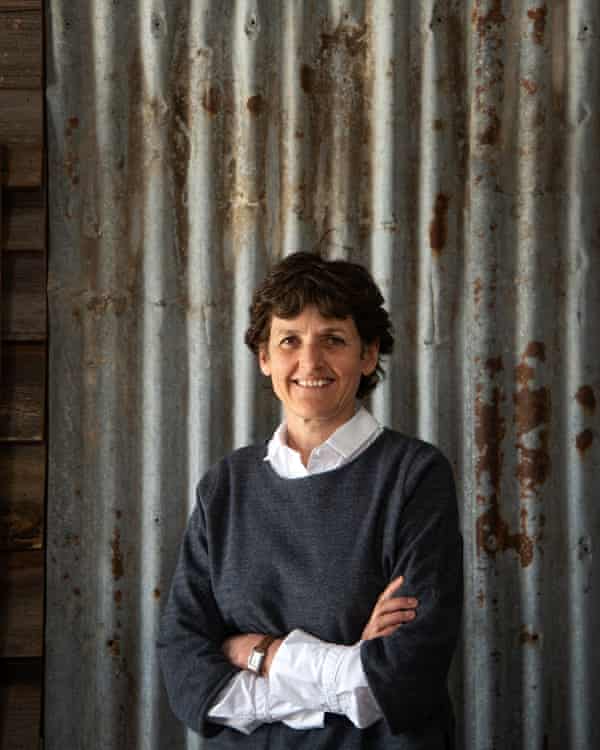This explosion of local kindness is clearly a response to a need and a failure – of political institutions and mainstream charities to provide the basic building blocks of a good life. But does it have theoretical underpinnings? Are there books inspiring this new localism?
Hannah Claxton, who quit her glamorous job in Damon Albarn’s management team to set up Eves Hill Veg Co – on land donated by a local farmer – cites Raj Patel’s book about the “world food system”, Stuffed and Starved, as a “massive influence” on her community garden. It is “the book I recommend to anyone trying to join up the dots about changing the way our food is grown and sold”, she says. Claxton’s project is also shaped by Vandana Shiva’s work in India and her books, such as Soil Not Oil, which demonstrate the importance of women working together. “Other books have described these ideas well,” Claxton says; “but those two stand out as making me believe: ‘Yes, this is what I need to do.’”
Claxton is in the vanguard of a market garden renaissance that is one response to the realisation that carbon-intensive industrial food production is bad for both consumers and producers. Another radical change is stirring larger landowners. The intensively farmed British countryside is set to be transformed more drastically than at any time since the 1970s: Brexit and the slashing of agricultural subsidies could bankrupt many farms.
In Norfolk, two estates, Ken Hill and Somerleyton, are rewilding significant tracts of their land. They have been influenced by the unlikely 2018 bestseller Wilding by Isabella Tree. Few expected the story of a wealthy couple who inherited a 3,500-acre estate in Sussex to be the biggest nature writing success of the past 18 months, but Wilding has sold more than 150,000 copies and spawned a movement.

“I’ve been completely amazed,” Tree says from her study at Knepp, the farm that she and her husband, Charlie Burrell, have radically transformed. “If I’d published this book six years ago, I don’t think it would have done anything. It just hit the moment.”
Wilding tells of the collapse of their conventional mixed dairy farm, and how they auctioned off their farm machinery, rewilded their land and accidentally discovered a new model of farming. Nineteen years on, Knepp is challenging concepts from three millennia of farming such as “hedgerow”, “field” and “weed”, as well as conservation orthodoxies that we must “manage” land to help certain species. It is a profitable farm that also features an abundance of wildlife, including new (returned) species such as storks and beavers and rarities that are vanishing from everywhere else – from turtle doves to nightingales.
Tree is now inundated with requests for help and talks. Knepp hosted 2,000 people on special “safaris” in 2017; this year it will host 6,000; 31 farmers from the area around Knepp have signed up to join a neighbourhood “cluster group” to improve the wider landscape for nature. “The loveliest thing is that they are all responding to that message of hope. There’s so much eco-gloom out there, the feeling that we can actually turn things around is what people are grabbing on to … Great white egret flying over!” Tree interrupts herself, as she spots one of Knepp’s latest exciting arrivals.
The first question she is always asked is a practical one: how can I rewild my land/garden/backyard? Tree thinks wilding can occur in tiny settings with the right interventions, and recommends Dave Goulson’s The Jungle Garden. She is now writing The Wilding Handbook to provide practical advice for everyone from big landowners to window-box owners.
Nature writer Mark Cocker believes that Tree has started a movement. “Grassroots activism is breaking out beyond the confines of the establishment and it’s possible that Wilding is the one book that has catalysed it.” His own book, Our Place, published in 2018, tells the history of British conservation in the 20th century and ends with a powerful list of hard truths that society must confront if nature’s decline is to be reversed.
Cocker is interested in what the plethora of new micro-local conservation groups reveals about mainstream conservation charities, many of which he thinks are now “irrelevant” to ordinary people who “actually want to be more emotionally identified with the action that takes place”. Charities such as the National Trust and the RSPB are “trapped by the size of their membership”, which makes them cautious. Even so, he believes they are still “very important because they are repositories for cumulative wisdom – they provide jobs and an outlet for members. They are channelling money in all the right directions but in terms of the needs of the moment, it’s a 16-year-old girl sitting outside her school in Sweden who is making the weather.”
Neighbourhood conservation efforts other than the remarkable rise of Extinction Rebellion are often driven by volunteers who Cocker believes aren’t prepared to think globally or act “politically”. “They are very happy to act locally, but they fall away the moment anyone makes noises beyond the parapet of their village boundaries,” he says. Localism’s big challenge is to unite and form part of a global effort, he argues. Cocker wants the vast but disparate British environmental movement to come together in a “council of nature”, which could apply proper pressure to central government.

For Rob Hopkins, the co-founder of the Transition Network, meaningful change is now most likely not at the centre but through local government. The Transition movement began in Hopkins’s home town of Totnes, Devon, in 2006, when people began sharing ideas of how to move from a carbon-based economy to a healthier, more sustainable community. Community change often begins with food. “You don’t need anyone’s permission around food. It’s not expensive. You just need people, tools and a deadline,” Hopkins says. In Totnes, “it’s been a fairly lonely furrow for a long time. Finally the surrounding world is starting to catch up a little bit.” Now that 245 local authorities across the UK have declared a climate emergency, which requires tough new carbon-reduction targets, councils will require the practical ideas of the Transition movement.
When we are told we must cut carbon emissions by 80%, “Where’s the story in that? Where’s the ‘I have a dream’ in that? What would that smell like?” Hopkins asks. “What communities can do so powerfully is to tell stories.” His new book, From What Is to What If, offers many inspiring stories of practical action, from the National Park City movement to the Bristol streets that have banned cars to allow children to play. Hopkins argues that we are “frogs in the boiling pan of imaginative decline” and we can and must leap free. As Paolo Lugari, the founder of a Colombian experiment in sustainable living, put it: “We are not confronting an energy crisis, but one of imagination and enthusiasm.”
We are social creatures living in a time that is trying to stop us from being that
Rob Hopkins
In France, some local mayors have already instituted radical neighbourhood changes. The former mayor of impoverished Grande-Synthe near Dunkirk made all public transport free, created allotments around apartment blocks, and passed on to the poor savings made from converting to low-energy street lights. In Ungersheim in Alsace, the mayor Jean-Claud Mensch created a community solar farm, made all school food organic and created market gardens to grow that food. “This is a win- win-win-win-win,” Hopkins says. “Why doesn’t this happen everywhere? It’s good for everything – physical and mental health, schooling, the local economy, the neighbourhood. There is so much waiting to happen, if you can just get beyond these ‘yes, buts’ all the time.”
There are two obvious “yes, buts” about burgeoning localism. One is that if individuals devote all their energies to parochial concerns they won’t bring about national or international political change. If we do good deeds in our market garden or forest school, we’re not demanding systemic change: we’re letting Boris Johnson’s government get away with it. Another fear is that local action simply fulfils David Cameron’s vision of a “big society”, proving governments don’t have to provide essential local services or even a safety net; instead we have the survival of the fittest communities.
Hopkins argues that people don’t choose between community action or wider political activism. Lots of Transition Totnes folk have joined Extinction Rebellion; the energy, he says, flows back and forth. “We really resisted the ‘big society’ quite vehemently. We can’t do business as usual and expect local people to run libraries. It’s not about communities doing things that governments should be doing. Transition groups really change the narrative about what’s possible, and do stuff governments could not do, wouldn’t imagine doing, wouldn’t dream of doing.”
I have discovered through my own volunteering for a couple of forest schools that the best way to chase away anxiety and despair is to do something positive locally with other people – something that isn’t driven by money. As Hopkins says: “I’ve never been anywhere where anybody has said: ‘I was doing all right until I got involved in this Transition stuff,’ or: ‘I was doing all right until I learned to grow my own food.’ We are social creatures living in a time that is trying to stop us from being that. There’s something good for the heart about being involved in projects with other people.”